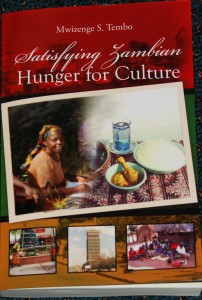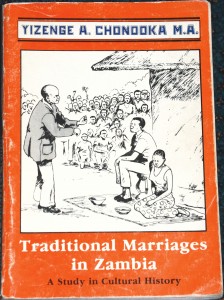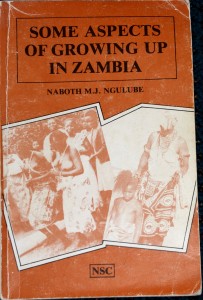by
Mwizenge S. Tembo
Professor of Sociology
Introduction
The term “Bride Price” should immediately be banned from use anywhere in Zambia and Africa to refer to one of our cherished customs. I realize that the Europeans invented this term “Bride Price” in the 1700s and 1800s to refer to a fundamental aspect of Zambian and culture may have done it out of ignorance at the time. The great late eminent African scholar Ali Mazrui would have called what those early Europeans did to distort the meaning of this custom “European cultural arrogance”. I understand that the Europeans and their scholars, some of whom may even be Zambians and Africans, may still want to use it. If they so choose they can use “Bride Price” within the confines of European borders all the way to Britain, Portugal, Spain, France, Italy, and Greece along the edges of the Mediterranean Sea. The people on the African continent must boycott and ban this term from Morocco, Algeria, Tunisia, Libya, Egypt all the way to Senegal, Ghana, Nigeria, Ethiopia, Somalia, Namibia, Botswana, Zambia, Mozambique, all the way to South Africa.
I will first explain to you why the term “Bride Price” must be banned, abandoned and boycotted. Second why there is so much confusion and ignorance about the term “Bride Price” among Zambians and Africans ourselves. Third, why the term “lobola” should be used instead using a dramatic social incident involving lobola going on in my large extended family right now. Lastly I will explain the proper traditional use of “lobola” today if you would like to engage in it as a family whether your ethnic group or some of the 72 “tribes” in Zambia practiced lobola or not. I will end with the conclusion of the advantages of lobola in the 21st century marriages and extended families.
Why “Bride Price” Should be Banned
When Europeans first began to sail along the West coast of Africa in the 1600s, they did not know anything about Africa and African culture. In fact they called the interior of Africa “The Dark Continent” because they did not know about Zambia, Africa and Africans. When the Industrial Revolution occurred in Europe there was tremendous excitement among Europeans. Adam Smith’s “Wealth Nations” vividly reinforced the dominant advantages of the just discovered capitalism which hinges on commerce as the buying and selling and free market exchanging of everything including physical commodities, services, land, minerals, tobacco, sugar, cotton, silk, spices, indigo. Later on the famous Karl Marx exposed the key inner workings of capitalism. It was not surprising that Europeans went on to enslave anywhere from ten to 20 million Africans in the brutal Atlantic Slave Trade and European Colonialism in Africa in this atmosphere of practicing and enjoying the fruits of newly found capitalism and advancement of science.
It was in this atmosphere that Missionaries like David Livingstone and mining prospectors such as Cecil Rhodes arrived in Zambia and Africa from 1850s onwards. It was later in the late 1800s to the 1940s and 50s that anthropologists began to create knowledge about us Africans and Zambians for the benefit not of us Africans but European audience however misleading and distorted this knowledge might have been. It did not matter to the Europeans then perhaps even now. They had no ideas about complex kinships, marriage and family customs that had existed among us Zambian and Africans probably for many centuries perhaps going back to 100,000 to 50,000 years ago since Zambians and Africans are the origins of all the 7 billion people.
The European explorers, missionaries, travelers, and especially anthropologists observed numerous customs many of the so-called tribes in Zambia and Africa were practicing. They may have noted at the time that among these primitive people called Africans, that when a man wanted to marry a woman, he had to transfer a certain amount valuables to the bride’s family; chickens, goats, cattle before the marriage could take place. The Europeans were so overwhelmed with capitalism, superiority complex and economic exchange of commodities that they wrongly called the custom: “Bride Price” and we as Zambians and Africans are stuck with that wrong term to this day. As a consequence among the 1 billion Africans especially the educated, we freely use “Bride Price” as it truly reflects what goes on in our marriages.
“Bride Price” does not exist
What many Europeans, educated modern Zambians, Africans, and other outsiders do not know is that the term “Bride Price” does not exist in any of the more than 18 Zambian major languages and may be 72 dialects, ethnic groups, and the 72 “tribes”. It may not exist among the 2,000 African languages and dialects. Even in Uganda where a feminists are fighting to eliminate the “Bride Price” which oppresses women in marriage.
For example, if the term “Bride Price” existed among say the Tumbuka people of the Eastern Province of Zambia and Northern Malawi, it would be called “kugula mwanakazi” which translates into English as “to buy a woman”. It would also be called “mtengo wa mwanakazi” which translates as “price of a woman”. These are expressions that are used for actual buying of commodities such as dresses, chickens, bicycles, and shoes. Instead the term that is used to refer to what goes on during complex marriage customs is “lobola” about which I will go into detail later. The distorted term “Bride Price” was inserted in all the press, books, college and university text books which are read around the world including our Zambian and African scholars. This had led to everyone wrongly believing we practice “Bride Price” which is the selling and buying of women and girls. There may have been some protests about the demeaning and dehumanizing nature of the use of the term “Bride Price”. The anthropologists and the editors of these text books that are circulated worldwide replaced the term “Bride Wealth” apparently to soften the use of the harsh term “Bride Price”. The distorted meaning of buying and selling women is still the same.
The Etic and Emic Perspectives
There are those who will argue that the use of “Bride Price” to describe a very important marital custom among Zambians, Africans, women rights campaigners, and radical feminist anthropologists is legitimate or accurately describes what is really happening because the natives themselves, including myself, are incapable of realizing what they are doing: buying and selling a woman. The argument is that it takes a clever outsider who is objective and educated may be with a Ph. D to actually explain the reality of the very rich social experiences if practiced the way it was in the African traditional society. The belief is that the “emic” is the perspective that the natives, local people, or insiders who say they are practicing the “lobola” custom will have. The “etic” is that perspective of the critical expert, objective, superior, more educated, better informed individual that calls this marital custom “Bride Price”. This “etic” perspective is what everyone should believe. The author strongly disagrees with this outdated point of view.
Lobola the Best Term
Zambians and Africans should never ever use “Bride Price” as it does not exist in any Zambian or African culture. Instead, lobola or any equivalent term in your indigenous Zambian or African culture should be used. Lobola may have been practiced among some ethnic and tribal groups going back to the 1820s. There is evidence of the practice among the Zulu in the Chaka Empire in the 1820s. (Ritter, 1955, 1978) The Ngonis and other tribes may have spread the marital custom among the peoples in present day Zambia, Southern Tanzania, Northern Malawi and elsewhere in Southern Africa.
What Happened During Lobola?
Let’s say John NKhata of Mtema Village knows a young woman Mary Mvula of Basiti that he would like to propose marriage to. John would go to Mary Mvula’s village and propose to her. If she finds him attractive and accepts the proposal, very complex social relationships and actions begin to develop. John’s family will select a Thenga or go between to go to Mary Mvula’s family to begin talks about malowolo. Immediately there were social ripples of excitement between the 2 large extended families of the couple because the two families were going to unite. Marriage in Zambian traditional society was never only about just the 2 people getting married. The malowolo negotiations would take numerous visits back and forth between the 2 families and villages. After may be 6 months to a year, the lobola may have been two cows and may be 3 or some other valuables. These were never meant for the father of the Mary Mvula to enrish himself or just to spend on his own. Almost always traditionally as livestock, it was seen as a modest investment to be kept for the whole family. The lobola was often never given in total before the marriage. What you are reading here about how lobola is conducted is very simplified and abbreviated. But the entire lobola social transactions and involving large kinship networks were very complex but very enjoyable and useful for the couple and the 2 large extended families in the two villages. Read Tembo, 2012; Chondoka, 1988, and Ngulube, 1989 for more details about this custom.
Lobola Custom in 2016
In May 2015, I received an email and later a phone call from Zambia. My large extended family in Zambia regularly hold family meetings which are modeled after the traditional mphala of the Tumbuka people or insaka among the Bemba people. They discuss family marriages and wedding arrangements. Often they get together to attend to funerals. One of our young men who is an engineer, who I will call David, had met and proposed marriage to a young woman from Central African Republic, Rita, who he had met while both were attending school at CrytalRose Polytechnic State University in Los Angeles in California. They wanted a traditional marriage including lobola. I was appointed the Thenga (go between) because I was an elder and knew the traditional marriage customs. I was surprised, honored and humbled to participate in this role. The first question I asked myself: “What young people today who are less than 30 years old, who grew up in the city like Lusaka, live abroad would want to practice the traditional custom of lobola in marriage?”
To cut a long story short, I consulted by phone and email with the Thenga from the bride;s family for 6 months. Both couple’s families are scattered in the Central Africa Republic Mali, Zambia, the United States and Britain. At one time we suspended the negotiations for more than a week because there was a death in the bride’s family in Bangui. Her uncle had died. Eventually, we came up with a lobola amount of several cattle equivalent in money. Members of the families will travel to Lusaka for the wedding soon. The couple will return to the United States as man and wife to start their lives together after the wedding. But families on both sides already know each other so much better because pf the lobola negotiations besides many other rich customs.
“Bride Price” distortions
There is plenty of confusion about the misuse of this very useful marital custom. There was headline in the international news a few months ago: “Uganda’s Bride Price Ruling Marks Women’s Rights Milestone, But Clashes With Customary Laws.” http://www.ibtimes.com/ugandas-bride-price-ruling-marks-womens-rights-milestone-clashes-customary-laws-2059128
Some will see my advocating this lobola which many will misinterprete as the same as “Bride Price” as setting back women’s rights in Uganda, Zambia and the rest of Africa. This would be throwing out the baby with bath water. This attitude or opposition would be understandable in that the use of “Bride Price” in the headline and in Uganda and elsewhere bears confirmation of the original sin or distortion when Europeans mischaracterized or distorted the custom. What compounded the problem is that virtually all educated Africans who use European languages have wrongly accepted the use of the term “Bride Price” instead of lobola.
The men and families who charge high “Bride Prices” because their daughter is educated or very valuable are playing right into the hands of the original Europeans who coined the distorted or wrong term “Bride Price”. The Ugandans and other modern Zambian and African men and families who abuse this “Bride Price” as license to abuse their wives and keep them captive when she wants a divorce are also ignorant because that was never the intended purpose of lobola in the traditional customs.
Conclusions
Practicing the original lobola in a positive traditional way with all its cultural and customary richness would be very valuable for strengthening marriages and strengthening families that unite in marriage today. Tribes and ethnic groups that traditionally never practiced the lobola custom can adopt it too to strengthen their marital experience. No Zambian and African should be prisoner of archaic terms that Europeans invented centuries ago to portray negatively what Zambians and Africans had enjoyed for ages. You will notice that I have avoided the use of the term “pay” to describe how the groom’s family delivers lobola to the bride’s family. This is another negative power of using English because it is a very powerful hegemonic tool for distorting our culture and creating the epistemology that both oppresses and distorts how we see our own lives as Zambians and Africans.
References
- Chondoka, Yizenge A., Traditional Marriages in Zambia: A Study in Cultural History,Ndola: Mission Press, 1988.
- Kottak, Conrad Philips., Anthropology: Exploration of Human Diversity, 12thEdition, New York: McGrawhill, 2008.
- Ngulube, Naboth M. J., Some Aspects of Growing Up in Zambia,Lusaka: Nalinga Consultancy/Sol. Consult A/S Limited, 1989.
- Ritter, E. A., Shaka Zulu,New York: Penguine Books, 1955, 1978.
- Tembo, Mwizenge S., Satisfying Zambian Hunger for Culture: Social Change in the Global World,Indian: Xlibris Corporation, 2012
- http://www.ibtimes.com/ugandas-bride-price-ruling-marks-womens-rights-milestone-clashes-customary-laws-2059128
- http://people.bridgewater.edu/~mtembo/menu/articles/TraditionalAfricanFamily.shtml
- https://hungerforculture.com/?page_id=334


